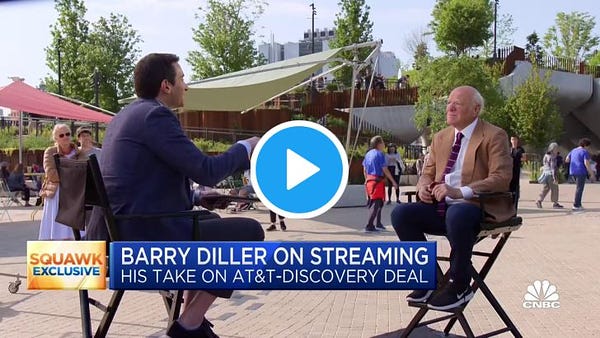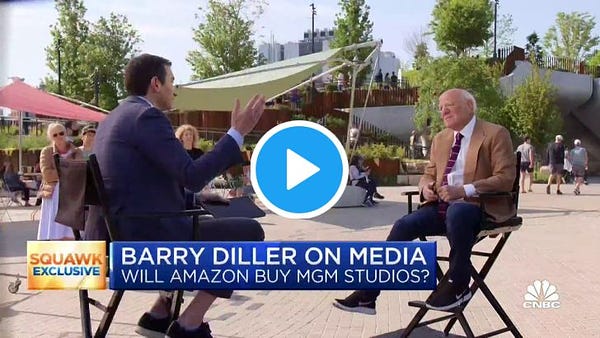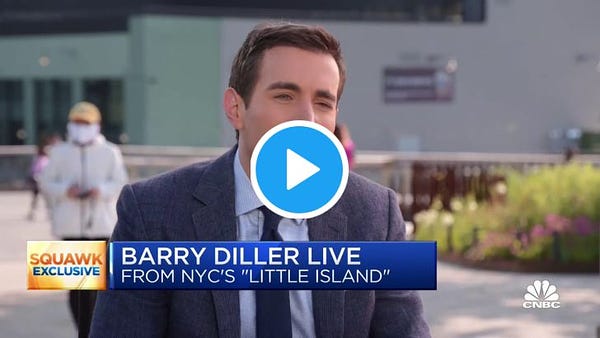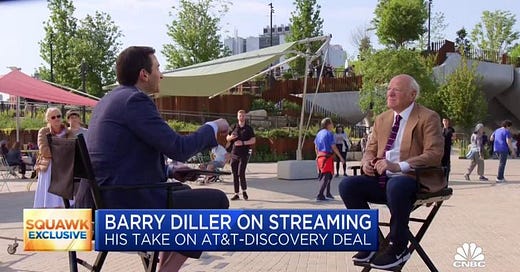PARQOR Monday AM Briefing #50
The stories and trends in OTT streaming you *need* to know for this morning & the week ahead
First, a reminder that I now will be sending all PARQOR mailings from this Substack - parqor.substack.com.
I will be relaunching PARQOR.com soon to be a resource for the Five Frameworks, only. The new site is almost ready. The objective is for it to be a business education resource built around the Five Frameworks, and expanding the offerings for members into spreadsheets and slides.
For subscribers who signed up for PARQOR.com via Memberful: I will continue to offer Memberful alongside Substack. With the new PARQOR.com emerging, keeping Memberful offers me some agility that Substack does not.
A Short Essay on IAC Chairman Barry Diller’s Newest Opinions on AT&T, Comcast and Disney
IAC Chairman Barry Diller has been a favorite source of insights on streaming for me. I wrote back in August as to why:
The short answer is, Diller is a successful executive with both past extraordinary success in legacy media, and who is finding success in DTC after having taken his lumps in digital media.
Diller offers an interesting mix of business insights, hearsay and unvarnished judgment on other executives and businesses. He delivers his opinions with the conviction of someone who has given a lot of thought and analysis to reach his own conclusions. He also is occasionally snarky, which makes him entertaining.
Those opinions were on full display in an interview last Friday with Andrew Ross Sorkin on CNBC’s Squawk Box. The interview marked the opening of his Little Island park off the West Side of Manhattan. The entire interview is paywalled on CNBC.com, but thankfully the CNBC social media team tweeted out the important highlights.
I often quote Diller's snarky, bullish take on Disney as the only media company which “will remain relevant into the future”. So, it was notable that in this interview, he walked back that prediction based on Disney CEO Bob Chapek “pushing” former CEO and current Chairman Bob Iger “to the sidelines” (something Variety reported last week).


Diller’s basic two points are, first, he disagrees with the moral aspects of Chapek’s decision to push out his predecessor, despite the move being business-as-usual in most corporations. Second, he disagrees with the business rationale of the decision: Iger’s understanding of the DTC marketplace, and his courage to move Disney into it, are irreplaceable. So why is he being sidelined? It is a bearish take on Chapek’s decision-making and DTC strategy that emerges when questions about the Chapek-led reorganization are emerging publicly, too.
Diller was notably bullish on Comcast’s strategy in streaming because they are “the only ones with both feet on both sides” of the streaming marketplace with X1 software and Peacock.


He makes an interesting point about Comcast having “a route to the sea… a route to all ports”. He doesn’t explain the analogy in detail, leaving the audience to guess the reference. The implication is Comcast is better off than a ViacomCBS because its X1 software enables it to take a share of other streaming services’ success (a model similar to Amazon Fire’s and Roku’s share of advertising and/or subscription revenues), while also offering an ad-supported streaming service, allowing it to avoid the limits of subscription-only models.
He appears to be complimenting Comcast for successfully managing risk in the emerging DTC marketplace: it is betting on broadband (profitable), betting on ad-supported streaming (ad sales is a strength of NBCU and Comcast), and moderate content spend ($2B) relative to Disney ($14B-$16B) Netflix ($17B) and DiscoMax ($20B). I have long argued that Comcast values its broadband business more than Peacock, and sees Peacock as a tactical asset in support of that business. Diller offers a nuanced, alternative take on that perspective.
By implication, he thinks ViacomCBS is more “land-locked” (my term, not his) because it is all-on on streaming, which is expensive and is not yet profitable, if it ever will be. That is an implicitly bearish take on Paramount+ and Pluto TV.
Last, Diller had some thoughts on the merger of WarnerMedia and Discovery, calling it “the great escape” for both WarnerMedia and AT&T, and praising “the scrappy Mr. Zaslav” as the right executive to lead it.


Diller’s perspective is interesting for how it looks at AT&T’s purchase and then sale of WarnerMedia through the lens of monopoly. AT&T may no longer be a monopoly, but it still has the power to acquire Time Warner’s assets “with an idea, but certainly not… fully fledged” of what it was going to do with them. The outcome was “hurting Time Warner assets”.
That said, it is notable that Diller’s example of poor management is the “incredible insult” of how AT&T management treated WarnerMedia News and Sports Chairman Jeff Zucker, and how they drove out talented WarnerMedia employees. It is an odd example of what AT&T did wrong, and the second story of victimhood of media executives he knows (the first one being Iger, above).
It is one of two critiques in the interview that reflect a bias against the perceived wrongdoings against those executives he knows and admires (Iger, Zucker). It suggests that, to Diller, how these companies incentivize and reward the talent with the most valuable skillsets to stay and contribute is indicative of the future success of a streaming media service. It may be as indicative to Diller as the key attributes of a successful media company in 2021 (The PARQOR Hypothesis).
Given that Disney has been the embodiment of these key attributes (BEADS acronym), it is particularly notable Diller believes Disney post-Robert Iger will face challenges because it is not understanding the value of Iger’s talent. He is implying that under Chapek, Disney is on a path to be demoted to caddy “on a golf course it will never play”.
That is a surprisingly bearish take on Disney’s future from one of its biggest bull supporters, to date. The question is whether it is a reflection of Diller’s favorable bias towards Robert Iger, or whether its a bearish signal for Disney worth keeping an eye on.
My two cents is, as I argued in February, it is ok to apply a skeptical lens to Disney’s ongoing evolution in the streaming era because it helps to understand the moving pieces of the business better. Few understand those moving pieces better than Barry Diller, and he sounds unusually skeptical about Disney post-Robert Iger.
Must-Read Monday AM Articles
I also wanted to write about the rumored acquisition of Metro-Goldwyn-Mayer by Amazon, reported first by The Information. The New York Times framed the recent, surprise return of Jeff Blackburn to run Amazon’s Global Media & Entertainment operations as an indication of the seriousness of Amazon’s interest in MGM. Too Much TV’s Rick Ellis learned from his conversation with Amazon execs that if the deal were to happen, “the lions share” of the MGM library would be rotated through IMDb TV.
The Information also reported that Netflix is looking to hire an executive to oversee an expansion into videogames, and in recent weeks, “has approached veteran game industry executives about joining the company”. TechRadar reported Netflix told them “we’re excited to do more with interactive entertainment”. The LA Times reported Netflix is also expanding its podcast business, taking pitches from outside producers and is looking to hire an executive to lead its audio push.
Netflix spectacle and events TV division leader Peter Friedlander broke down the difference between spectacle and event programming to Business insider. Last, Reed Hastings told investors in its Q1 earnings call that it is “still figuring out India”, with only 4.5MM subscribers to 26.6MM+ on Disney+Hotstar. There has been a string of executive departures, including most recently its director - Original Films for India.
Upfronts were last week, and Lesley Goldberg has a good summary of four takeaways at The Hollywood Reporter. The big news out of Upfronts was the announcement of HBO Max With Ads at $9.99. AdWeek has a summary of the ad formats being offered to advertisers, including brand blocks, pause ads, and branded discovery ($ - paywalled).
WarnerMedia also announced “the launch of Front Row on TBS and Front Row on TNT, new premium content destinations that will be presented with limited commercial interruption and feature select Max Original series and key TBS and TNT content.”
AdWeek also offered a deep dive into Discovery’s soon-to-be-launched Magnolia Network with Chip and Joanna Gaines.
Variety VIP’s Gavin Bridge reports that ad fraud continues to be a problem in Connected TV, reporting 18% of ad inventory on CTV and devices was suspicious. That figure increased to 20% in 2020.
Apple TV+ may have 40MM subscribers, according to Ampere Analysis, most of them non-paying. Analyst Benedict Evans told a conference “that “ownership of content has no strategic value to tech companies,” and specifically said that “Apple has lost interest in TV.”
The market for foreign-produced content in the U.S. is growing, and demand for live-action Japanese shows is being fueled by people looking for more programming after becoming familiar with anime.
Rick and Morty creator Dan Harmon revealed that Krapopolis, the title of the new series on Fox, will be based on cryptocurrency and NFTs. But, “the moral and environmental strain of NFTs” has turned fans against Krapopolis.
Julia Alexander of IGN argues “ViacomCBS is in a position to become a go-to streamer for kids content” with Nickelodeon, but “Executives overseeing Paramount+ need to determine how to make it a necessity, not just an option”.
Comcast Chairman and CEO Brian Roberts had a 20 minute interview with Benjamin Swinburne, Head of U.S. Media Research at Morgan Stanley, to discuss competition, innovation and the shifting media landscape (Video). Alex Sherman reports “the pressure’s on ViacomCBS and NBCUniversal” to find a merger partner after the Discovery-WarnerMedia deal.
There was some terrific post-deal reporting and writing on the Discovery-WarnerMedia, or “DiscoMax”, merger. The New York Times wrote a fun, behind-the-scenes piece on the deal negotiations in a West Village townhouse. The New York Post reported “a quiet dinner in Dallas” between AT&T CEO John Stankey and former CEO Randall Stephenson the evening of May 14, when rumors of a deal emerged.
Antenna Data shared data that HBO Max and Discovery+, under one combined company, would own 13% of all Premium SVOD Subscriptions in the U.S. as of April 2021.
David Bloom of TVREV has a good breakdown of the important, looming questions for both companies after the merger.
The New York Times dove into AT&T’s history as a monopolist and the problems of a “bigger is better” mentality. (a reflection of Diller’s point, above). The FT reports “US telecoms decide focusing on pipes isn’t so dumb after all”.
Georg Szalai of The Hollywood Reporter reports that the WarnerMedia-Discovery merger is driving new speculation of media consolidation in Europe.
Variety delivered its first Silicon Valleywood Impact Report with profiles of key players at the intersection of technology and creativity
Last, Vox has a fun piece on how TikTok is the world’s first algorithmically driven talent show where the stars its algorithm rewards suffer from “blandness”.



